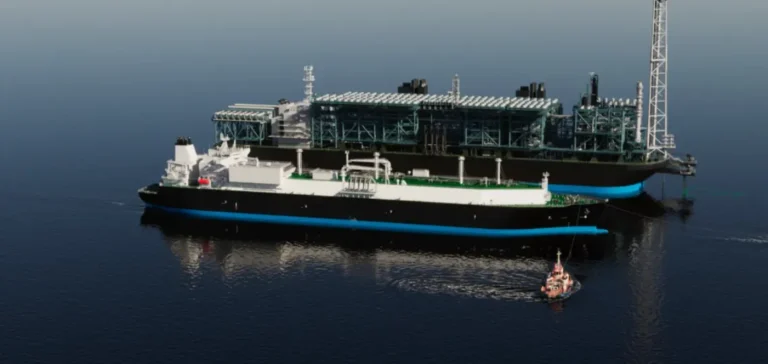Delfin Midstream Inc. (“Delfin”) has signed an agreement with Siemens Energy Inc. (“Siemens Energy”) to secure manufacturing capacity for four sets of SGT-750 mechanical drive gas turbines. This equipment will be used to drive the mixed refrigerant compressors within the liquefied natural gas (LNG) liquefaction system developed by Delfin. The announcement comes as part of preparations leading up to a Final Investment Decision (FID) that Delfin plans to take during autumn 2025. The project, based in Louisiana and the Gulf of Mexico, is described as a major energy infrastructure project in the United States.
Preliminary programme with Samsung Heavy Industries
In addition, Delfin has initiated an early works programme with Samsung Heavy Industries (“SHI”) and the engineering company Black & Veatch Inc. (“B&V”). This programme aims to further define technical specifications for the company’s first Floating Liquefied Natural Gas (FLNG) vessel. The objective is to provide a solid basis for the future lump-sum turnkey Engineering, Procurement, Construction and Integration (EPCI) contract. This preliminary work is also intended to ensure that contractors are ready to execute the project immediately after the FID is confirmed.
Dudley Poston, Chief Executive Officer of Delfin, stated: “All work is proceeding according to the planned schedule. The investment made to secure manufacturing capacity is critical for maintaining our timeline, with delivery of the first FLNG vessel by Samsung Heavy Industries expected in 2029.”
Strategic licence received from MARAD
On March 21, 2025, Delfin LNG LLC, a subsidiary of Delfin, obtained the first deepwater port licence issued by the U.S. Maritime Administration (“MARAD”). This licence authorises the company to own, construct, operate and export liquefied natural gas from the United States. The authorisation, issued in accordance with the Deepwater Port Act of 1974 and MARAD’s Record of Decision from 2017, also aligns with the executive order signed by President Trump on January 20, 2025, titled “Unleashing American Energy”.
Delfin’s FLNG project plans to operate up to three floating units with a total annual production capacity of 13.2mn tonnes of LNG. Due to cost-effective floating technology, the existing deepwater port infrastructure requires minimal additional investment to reach its full production capacity. The company anticipates its project potentially becoming the first deepwater port facility dedicated to LNG export in the United States, providing significant economic contributions.
Siemens technology at the heart of the project
Karim Amin, Executive Board Member of Siemens Energy, noted that the gas turbines selected by Delfin feature a modular design and an excellent power-to-weight ratio. “Siemens Energy turbines offer technical characteristics particularly suited to the planned U.S. offshore project, notably due to their efficient operation under diverse conditions,” he stated.






















